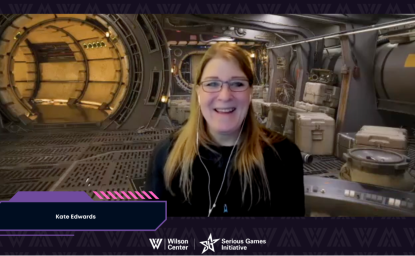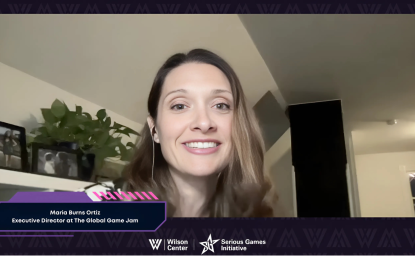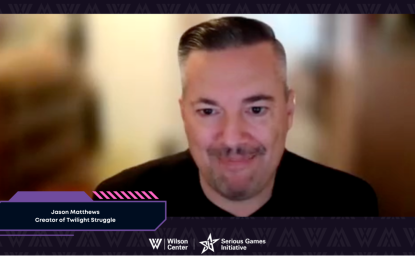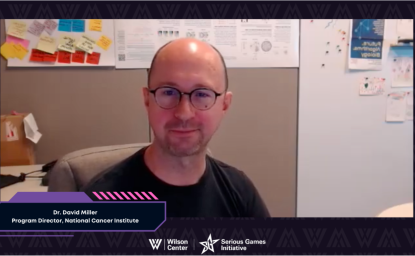Elizabeth Newbury:
Welcome back to the Serious Games Initiative at the Wilson Center. This particular series is our talks with a couple of leading experts from the field of serious games. As you may know, the Serious Games Initiative is celebrating its 20th anniversary of developing and researching games as a means of understanding research and the social good. Throughout the decades, our approach has focused on amplifying both science and policy through the medium of games. Some of our more popular titles are we started with Budget Hero and The Fiscal Ship, which are all about the federal budget. And then we've recently developed a series of games on environmental policy, The Plastic Pipeline being one of them, and then also everyone's favorite topic, artificial intelligence. So we have one on AI and bias, and then we also have one that's forthcoming on deepfakes. Stay tuned and we'll link those below. But really, to celebrate the 20th anniversary, wanted to showcase the field of serious games. One of the things we do here at the Serious Games Initiative is we support the broader field of practice, and we have put together a series of interviews with leaders from the field to try to talk about the past, the present and the future potential of serious games. I am very lucky to be joined here today by Professor Lindsay Grace and my first question, Lindsay is, if you could please introduce yourself and how you orient towards serious games and just take it away from there.
Lindsay Grace:
Certainly. Thanks for having me. I am currently Knight Chair in Interactive Media at the University of Miami and also directly in the bay. A lot of the work that we do is focused on social impact games, and I've been producing and teaching social impact games for just about 20 years now, my focus has always been on what we call persuasive games, which are games designed to change people's interest, activities and opinions across a myriad of domains. So most recently, it's been a lot of work around misinformation, disinformation, and how we train people away from being susceptible to the sort of standards that might diminish their ability to make responsible decisions. But I've also done work in language learning. I've done work in trying to produce and encourage and amplify various voices. So I produced three books in the last couple of years. One of them is Doing Things with Games: Social Impact Through Play, which is about how we can employ play to create social impact. And then another is a book that's basically called Black Game Studies, that's about looking at the sociocultural interaction or intersection between games and how we understand cultures, experience in groups, out groups, etc.
Elizabeth Newbury:
So you have a wide range of expertise within this field, and also just a long history within this field. Can you think back to when you got started? I don't want to put a time frame on it, so I'm happy if you want to put that flag in the sand and sort of describe what you saw as the spark or the catalyst of interest in serious games.
Lindsay Grace:
I thought about this a lot, actually. And I think one of the things that is really sort of interesting about the context under which I came to social impact games is that I was a gamer myself and then a game designer. And one of the things I noticed is that games themselves can be really effective teachers. So the game that brought me to social impact games is actually Gran Turismo. And the reason is Gran Turismo is this sort of tireless teacher for how to drive a car effectively. And the game is structured with like these tests. You get a license, and then you use that license on certain levels, and you're constantly unpacking that combination of structure and the sort of relentless, let me just keep trying. Eventually I'll get passed that track in two and a half minutes, like we're supposed to really kind of teased me into the idea that games are not only entertaining spaces, they're instructive spaces. And there's spaces that have these wonderful balances of engagement, and that's sort of like what I call sort of tireless teaching. They're happy to tell you the same lesson 16 times, but the lesson is learned not through sort of a lecture, but through the practice, right? So a lot of in my research, I often emphasize the games are basically problems and solutions, and the problems are produced by game designers, and the solutions are offered by games. So if you think of a game like Super Mario Brothers, it's that you are given some problems get across the level, and sometimes there's an enemy, a non player character, sometimes there's a physical obstacle, but you're getting past that. And so my understanding social impact games is that we can help look at real world problems and practice addressing them, or at least examining the systems that produce them more and more, similar to the kind of work that you do, say in The Plastic Pipeline, we're exposing a system and then helping people understand how that system could be played with perfected, improved route, etc. So my origin is really just about how happy I am. I used to race cars, and then I got to play Gran Turismo. Fell in love with and said, this is a great opportunity to use instruction.
Elizabeth Newbury:
That's amazing. And one of the things I really appreciate about your research is you tease out the importance of play and play for learning. I was wondering if you could, because thinking back 20 years ago, that's pretty a novel concept, if you could talk a little bit more about that.
Lindsay Grace:
Certainly. So one of the things I often try to articulate, I've done this in some of my writing, is the idea that play itself is naturally part of the way that humans learn. So we have from evolutionary psychology and understanding that people who are not allowed or encouraged to play actually end up with developmental deficit. Play is how we interpret the world. And so one way to think about it is that when you're in a playful state, you're in a state where you're interested in maybe experimenting and finding the borders in engaging in something with a lot of energy, really sort of vigorously interrogating. And so what we do when we engage people in social impact game design is we're actively trying to encourage them to tap that natural part of their brain. So in the animal world, we demonstrate that, say, a cat playing with a toy is actually practicing the practical benefit of hunting. And you can see this in dogs. You can see it in all kinds of well studied animals. And so what we're really doing is tapping into the same human instinct to understand a problem and interpret it through play. It's a place where we also are not only experimenting, but we also feel like it's a safe space. The mental state of play, which we've come to understand much better over the last 20 years, is actually a really unique and wonderful place for learning and then exploring new ideas. And so a lot of the work we do in social impact games, we're trying to say, give you a new perspective or inspire you to look at something differently. It's a great space to do so because you don't have the same sort of reticence you might in a high stakes, high stress, non safe environment. So one of the ways we also encourage this is that we engage people in playing more and in designing play. So I've worked a lot with the US embassies over the last couple of years, producing game jams that are about social impact issues. And we have a great paper that's coming out, a more thorough version of it is coming out in about two or three months, that actually talks about how we've discovered that more people, or people more learn more about a social impact topic by participating in a game jam than they do about game design. So the blur is, I'm actually learning about this system I now understand. I don't know climate change more than I have before, and what we do is we encourage them through game jams to explore their understanding and to try and create a game around the systems that they're examining. It's really neat. It's a sort of game making, which is really where I started in this domain, plus the experience of game playing. Both are instructive, useful ways to understand complex problems.
Elizabeth Newbury:
So that sort of introduces my next question, which is, if we fast forwarded to the state of play, if you will, of today. How have you seen the field transform? I'm thinking back to your example of game jams, for example. That was a hot topic like a decade ago or so in the federal government. And there might be a renewed interest spent some recent efforts through embassies and through other forms of public engagement that focus on game jams as an example of that. So how has the field changed in those?
Lindsay Grace:
Sure, so I've actually, I think I've been around for sort of the birth and rebirth of game jams. So I served on the board for the Global Game Jam for five years, and as vice president of the nonprofit. So I've had both sides. I also obviously have helped support, run and participate in multiple game jams. And one of the things I think is fundamentally wonderful about the growth of game jams, and what I think you can see in the current state of game making, in particular, especially social impact space, is the thing that we kind of hope the internet would do, which is form a democratizing force. There's a democratization of games. So we talked about this early in the sort of the birth of indie game making. But what we're seeing now is that because of this sort of consumer producer who's played games as a kid, people have a much better understanding of how games as a medium can explain, explore and meet. And so at one point, you use a term like meaningful play 20 years ago, and people sort of crinkle their eyebrows and ask, What do you mean? And now what we have are people who are raised on that concept. So in 20 years, my students, who are now on average, about 20 years old, are actively aware of this meaning and interested in playing. It's not that far from what we saw in other media, say, rock and roll in the 1960s rap in the 80s. It's that we are understanding the medium so much better, in part because people raised on. Right? And so the contemporary environment is we have fertile ground for creating social impacts. The other factor, I think, that's really important to contemporary is people's growing interest in DIY and in understanding where a product came from. So the pipeline, how did this idea, this project, come to be is often really compelling. It's the version of farm to table, but in game. We're now we have people saying, oh, I want to know about the person who made this game. I wanna understand that it involves their values, their interests. And so that early research I did many years ago about understanding what we call sort of software studies, or the fact that the games we play with and actually integrate our own values is somewhat innate to some populations, and now they want to know more about the person. So it makes it for much more fertile ground for games as art, for games as a meaningful medium.
Elizabeth Newbury:
And you're talking about knowing about the person who's developing the games. So I'm going to do a hard pivot here, because something you mentioned in your introduction, and that is supporting this broader community of practice of particularly black developers. I was wondering if you could talk a little bit more about that, because I see that as something that has is really contemporary to the moment, but it has a long history behind it.
Lindsay Grace:
Yes, yes. So one of the things I've been doing a lot in my career is basically because there's a matriculated, tenured faculty all this business is trying to help amplify other voices. And it's a shocking that we have some areas of game study. There's queer game studies, there's indigenous game studies, and it took us a while to get to black game studies. And so what's been really exciting about it in the present is the number of people who are kind of coming out and saying, Well, I've been integrating this in my practice. I've been doing this kind of work. I wanted to do this kind of work, but didn't know where to go. And so one of the things we're doing is fostering more of these communities. So, for example, the Strong National Museum of Play. Next year, we'll actually be conducting the first BIPOC game studies conference, and we'll be doing that as a way of bringing together all of these people who may have been working independently in the domain and finding a way to sort of create community around it to foster that growth. The short version of the findings in our first black game studies book was really actually about saying, Here's a concept. Here are some people are participating in this community. Here are some people who contributed substantially to it, and then trying to help us understand exactly what it means, especially as the black diasporic changes over time, to participate in black game studies. So we have some researchers who's been understanding the social, cultural context around these games, but there are a bunch of indie game designers who are trying to do things like tell their unique version of a story, and it's neat because sometimes it's about in group out group there. We've got games that I've referenced in the book that are about diasporic experience, but there are also ones about building community. There's card games about how, say an African American, you can have conversations with the rest of your family about inheritance and finances and how you can, like, foster cultures within a community. So what's really exciting about it is that what we've done, is there's no discovery here, but what we're doing is simply amplifying something that was there that hadn't been, I think, aggregated as clearly.
Elizabeth Newbury:
That's a really important part of some of the work that I know that you've done historically and other capacity building, but also some of the work that we've done here. So like amplifying voices with historically black colleges and East boards, it's not that exactly your point. It's not that they aren't there. It's just that someone needs to shine a light on it.
Lindsay Grace:
Yes. And one of the things I was trying to do, because I have a whole other art practice that's around curating games, is I'm trying to make sure that we archive these games and that they don't get lost, and that they have the sort of cultural resonance that if 15 years from now, someone wants to understand them, they have at least one thing they can look at. So in the Archean context, was always about publishing small books that captured the exhibition. And what we're doing with black game studies is trying to create an academic archive so that they don't dissipate or they aren't lost with the oral tradition.
Elizabeth Newbury:
That's wonderful, if there's any links that we can include down in the description below or in our posts on this on social media, please let us know so that we can help also amplify that work. Thinking to the future of games for social impact or serious games. What is the next big thing that you see coming down the pipeline for the field?
Lindsay Grace:
I think it's a few things. I think what we're going to need to do is that there are, both, as in anything, sort of opportunities and threats. So in the early days, and I made this observation several times, but in the early days of the Internet, we were extremely optimistic about how much it would help society, and it was going to be. The truly democratizing force for information. Fast forward to now, and we are swimming in misinformation, disinformation and the ability thanks to generative AI, but many other forces, the ability to produce misinformation, disinformation has become increasingly easy, and one of the things that I think we have to do, because game players tend to be this is look at the systems, look at the structures, and try and figure out an optimal path forward. So if I were to say, sort of like, what's a a hot space in social impact games right now, it's actually about trying to understand how games and medium can be integrated into the way that we work, play, engage in a variety of tasks, but recognizing the potentials that it could go detrimentally for us so often, what I do is I like I gave a lecture at the ophthalmology conference for or not ophthalmology, sorry, radiology. And one of the things that we did was I showed them how many games have helped in radiology examine data that AI is just short on. So it's similar, in delivery, they talk about that last mile problem. You can get a freight truck pretty much there, but then you have to distribute it to individual needs. And actually think that a lot of what we know about effective AI, about effective procedural generation comes from the world and games. So we introduced everything from the graphical processing units that you need to do really great graphics rendering to some of the other computational need. People bought nice computers because they wanted to play nice games. And I think what we've learned is helping the industries that aren't necessarily entertainment industries move forward, but it also means that we have good, solid experience on how fictions are created and how fictions are discovered. And so I think one of the things that is clearly going to be a hot topic is trying to employ the vast energy we imply we use in games to address real world issues. So I've talked about human computation use, for example, as a really great way to get at the last mile AI problems through games basically ask people to play a game for problems that computers aren't very good at, like identifying tumors in a skin cancer graft, and then make it playable through column isomorph, and then refeed that data into AI. So I think that's one of the cool features.
Elizabeth Newbury:
That sounds like...I love the metaphor the last mile. I think that's a great one. And I just, I think that there's a lot of desperate need for also media literacy around these issues, exactly as you're pointing out. But yeah, so I wanted to say thank you so much for joining. That was my last question. So I really appreciate your time, and it's always a pleasure to chat with you, Lindsay, and really appreciate it.
Lindsay Grace:
Thanks for having me.
Elizabeth Newbury:
For everyone watching, stay tuned for the next interview. Thank you so much.












